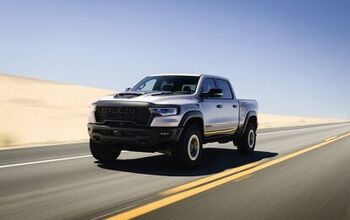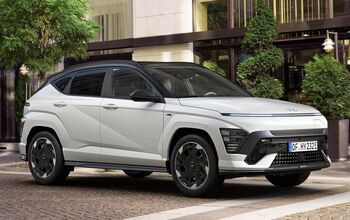2011 VW Jetta Pricing: TrueDelta Does The Numbers
As part of its quest to become the world’s largest auto maker, Volkswagen decided to design and engineer a pair of sedans specially for the American market. Compared to VW’s traditional, Eurocentric products, the new sedans will be larger, less sophisticated, and cheaper. The first of these, the new 2011 Jetta, has now arrived. It starts at $14,995 (plus $770 for destination), a substantial $2,590 less than the 2010 Jetta and also less than many other compact sedans. A German-engineered sedan for less than $15,000 certainly got everyone’s attention. Which was of course the point. But is it a good value?
TrueDelta.com has a price comparison tool designed to answer such questions. Compare the cars using this tool, and you’ll find that the 2010 Jetta included about $3,200 in additional content—even without considering its larger base engine. (Volkswagen has resurrected the MkIV Jetta’s antiquated two-valve, 115-horsepower 2.0-liter four for the 2011 car’s lower trim levels.) Among the deleted features: air conditioning, the audio system, cruise control, rear disc brakes, remote keyless entry, power mirrors, and power seat recliners. Suddenly the new $14,995 special doesn’t seem so special.
The 2011 Jetta S costs $1,000 more than the base model, but includes about $1,600 in additional features, including A/C and an audio system. It’s a better value, and probably the least expensive trim level dealers will actually stock. The 2010 Jetta S cost about $1,600 more, but had about the same amount in additional content—again disregarding the smaller, weaker engine in the 2011. So here as well the 2011 Jetta actually isn’t as good a value as the 2010 was, despite its lower price.
Equip both the 2010 and 2011 with the 170-horsepower 2.5-liter five-cylinder engine, six-speed automatic, sunroof, and nav, and the sticker prices are nearly identical. But the invoice prices, more indicative of what buyers actually pay, are not. VW cut dealer margins from about 5.5 percent of MSRP to four even, good for a “hidden” $350 price increase. A small adjustment for feature differences (this time in the 2011’s favor) leaves the 2010 SE with a $382 value advantage over the 2011 SEL. The 2011 is aided in this calculation by a new, decontented, value-priced nav system that is standard on the SEL (and that has fans of the brand less than happy with its lesser functionality).
How does the new 2011 Volkswagen Jetta compare to the competition? First let’s look at base trims, with A/C if available:
HPMSRPInvoiceAdj. InvoiceDiff.2011 VW Jetta Base*115157651516515165N/A2011 VW Jetta S115167651612514538-6272010 VW Jetta S170183551769914594-5712011 Chevy Cruze LS136169951634413747-14182010 Honda Civic DX*140163651514416178+10132010 Honda Civic VP140171151583215756+5912010 Kia Forte LX*156143901412514438-7272010 Kia Forte EX156166901592513638-15272011 Mazda3 i w/AC148171051607915237+722010 Toyota Corolla CE132162001519514820-345* no A/C
For the reasons noted above, the Jetta S is actually more competitive than the advertised special once the level of content is considered. This situation isn’t unique to the VW; with both the Honda Civic and the Kia Forte the base car without A/C seems a poor value compared to the next trim up. These trims exist for advertising purposes; the manufacturer wants to sell as few of them as possible.
The new Jetta S, Mazda3 i (with optional A/C), Chevrolet Cruze LS, Honda Civic VP, and Kia Forte EX all have invoice prices around $16,000. The Corolla CE, with an invoice price around $15,195, is an outlier partly because of the fatter margins enjoyed by Toyota dealers. Adjust for feature differences, and the 2011 Jetta S emerges mid-pack. The Honda comes in considerably higher than the others, while the Chevrolet’s and Kia’s relatively high feature content results in much lower adjusted invoice prices.
Next, the same models with uplevel engines, automatic transmission, sunroof, and nav:
HPMSRPInvoiceAdj. InvoiceDiff.2011 VW Jetta SEL170241652322923229N/A2010 VW Jetta SE170240352267922847-3822011 Chevy Cruze LT*138246852346422461-7682010 Honda Civic EX-L*140245152261922759-4702010 Kia Forte SX**173197901882520911-23182011 Mazda3 s167239652224921706-15232010 Toyota Corolla XRS158237252151122828-401* adjustment includes $900 for leather upholstery
** no nav
When equipped with a competitive engine, the new Jetta remains more expensive than all of these competitors once feature differences are accounted for. Even before this adjustment it’s more expensive than all but the Cruze. The Forte is priced much lower than the others, but doesn’t offer nav. The Mazda emerges as the strongest value, thanks largely to a value-priced nav system.
A common pattern emerges in these competitive comparisons. The 2011 Volkswagen Jetta is priced on par with or below the competition, but usually includes far fewer features. On top of this, the new Jetta has been decontented in ways that TrueDelta’s price comparison tool does not take into account, most notably cheaper materials and a less sophisticated rear suspension. VW seems to be betting that American car buyers, their attention captured by the substantially lower base prices, will not notice the feature deficit or cheaper materials. If buyers do notice these things, then there’s little reason (with the possible exception of a roomier rear seat) to expect the new Jetta to sell better than the old one did.
Even if sales remain the same, Volkswagen will benefit. The 2010 Jetta’s prices were already much lower than those VW is able to charge in Europe. Even with assembly in Mexico, the 2010 Jetta was probably marginally profitable—at best—in the U.S. The 2011 car is clearly much less expensive to produce, and so should be much more profitable even if the hoped for sales increase does not materialize.
Michael Karesh lives in West Bloomfield, Michigan, with his wife and three children. In 2003 he received a Ph.D. from the University of Chicago. While in Chicago he worked at the National Opinion Research Center, a leader in the field of survey research. For his doctoral thesis, he spent a year-and-a-half inside an automaker studying how and how well it understood consumers when developing new products. While pursuing the degree he taught consumer behavior and product development at Oakland University. Since 1999, he has contributed auto reviews to Epinions, where he is currently one of two people in charge of the autos section. Since earning the degree he has continued to care for his children (school, gymnastics, tae-kwan-do...) and write reviews for Epinions and, more recently, The Truth About Cars while developing TrueDelta, a vehicle reliability and price comparison site.
More by Michael Karesh
Latest Car Reviews
Read moreLatest Product Reviews
Read moreRecent Comments
- Ajla Both parties are in favor of banning Chinese vehicles so I don't see how it won't happen in the next year.
- Add Lightness I don't waste a lot of time watching nothing much happening by watching the YouTube 6 minute highlights.
- MrIcky from my rental fleet experience, id rather drive one of these than a camry.
- Add Lightness Protectionist fear competition under the guise of paranoia.
- Kjhkjlhkjhkljh kljhjkhjklhkjh But facebook, instagram, twitter, your cell phone, your chevy/ford/dodge, your debit card, your credit card selling your data to the SAME OVERSEAS DATABROKERS is ok.Meanwhile parler, telegram literally run on russian hardware is also ''ok''


































Comments
Join the conversation
It's astonishing to see that, after 60 years of doing things the right way and shoving their way into the US market by stolidly refusing to do things the GM way, suddenly VW is playing GM games - amazing to see such a one-time quality focused marque bowing to the profit margin like this. I cant imagine a less appealing item - an expenisve, under-optioned car with questionable reliability that is expensive to repair. I'm worried someone got the wrong idea during a meeting when someone offered 'we need to start competing with General Motors' Bring on the Koreans!
Dear Jetta, I know, change is hard. You never considered making efficiency, reliability, and fun available in every model. So it must be hard for you to hear Detroit Free Press say that you are dull, lacking excitement and character...or have J.D. Power & Associates annually place your brand near the bottom of its quality surveys. Don’t worry Jetta, most people won’t even notice after you're gone. The all new Chevrolet Cruze. Starting under 17,000. Get used to more.